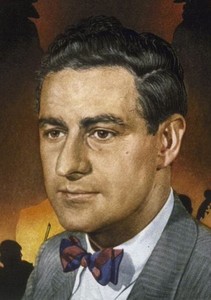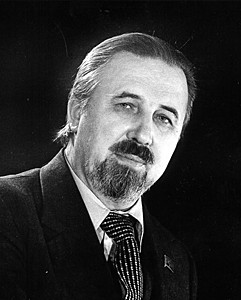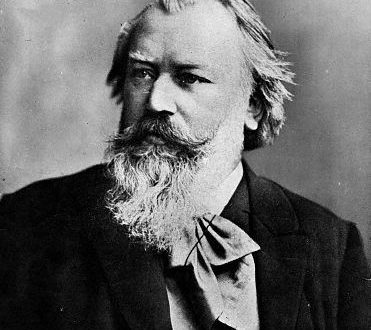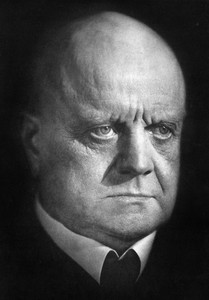
Gian Carlo Menotti |
Contents
Gian Carlo Menotti

The work of G. Menotti is one of the most notable phenomena in the American opera of the post-war decades. This composer cannot be called a discoverer of new musical worlds, his strength lies in the ability to feel what requirements this or that plot makes for music and, perhaps most importantly, how this music will be perceived by people. Menotti masterfully masters the art of the opera theater as a whole: he always writes the libretto of his operas himself, often stages them as a director and directs the performance as a brilliant conductor.
Menotti was born in Italy (he is Italian by nationality). His father was a businessman and his mother was an amateur pianist. At the age of 10, the boy wrote an opera, and at 12 he entered the Milan Conservatory (where he studied from 1923 to 1927). The further life of Menotti (since 1928) is connected with America, although the composer retained Italian citizenship for a long time.
From 1928 to 1933 he improved his compositional technique under the guidance of R. Scalero at the Curtis Institute of Music in Philadelphia. Within its walls, a close friendship developed with S. Barber, later a prominent American composer (Menotti would become the author of the libretto of one of Barber’s operas). Often, during the summer holidays, friends traveled together to Europe, visiting opera houses in Vienna and Italy. In 1941, Menotti again came to the Curtis Institute – now as a teacher of composition and the art of musical dramaturgy. The connection with the musical life of Italy was not interrupted either, where Menotti in 1958 organized the “Festival of Two Worlds” (in Spoleto) for American and Italian singers.
Menotti as a composer made his debut in 1936 with the opera Amelia Goes to the Ball. It was originally written in the genre of the Italian buffa opera and then translated into English. A successful debut led to another commission, this time from NBC, for the radio opera The Old Maid and the Thief (1938). Having begun his career as an opera composer with plots of an entertaining anecdotal plan, Menotti soon turned to dramatic themes. True, his first attempt of this kind (the opera The God of the Island, 1942) was unsuccessful. But already in 1946, the opera-tragedy Medium appeared (a few years later it was filmed and won an award at the Cannes Film Festival).
And finally, in 1950, Menotti’s best work, the musical drama The Consul, his first “big” opera, saw the light of day. Its action takes place in our time in one of the European countries. Powerlessness, loneliness and defenselessness in the face of the all-powerful bureaucratic apparatus leads the heroine to suicide. The tension of the action, the emotional fullness of the melodies, the relative simplicity and accessibility of the musical language bring this opera closer to the work of the last great Italians (G. Verdi, G. Puccini) and verist composers (R. Leoncavallo, P. Mascagni). The influence of M. Mussorgsky’s musical recitation is also felt, and jazz intonations sounding here and there indicate that music belongs to our century. The eclecticism of the opera (the variegation of its style) is somewhat smoothed out by the excellent sense of the theater (always inherent in Menotti) and the economical use of expressive means: even the orchestra in his operas is replaced by an ensemble of several instruments. Largely due to the political theme, The Consul gained extraordinary popularity: it ran on Broadway 8 times a week, was staged in 20 countries of the world (including the USSR), and was translated into 12 languages.
The composer again turned to the tragedy of ordinary people in the operas The Saint of Bleecker Street (1954) and Maria Golovina (1958).
The action of the opera The Most Important Man (1971) takes place in southern Africa, its hero, a young Negro scientist, dies at the hands of racists. The opera Tamu-Tamu (1972), which in Indonesian means guests, ends with a violent death. This opera was written by order of the organizers of the International Congress of Anthropologists and Ethnologists.
However, the tragic theme does not exhaust the work of Menotti. Immediately after the opera “Medium”, in 1947, a cheerful comedy “Telephone” was created. This is a very short opera, where there are only three actors: He, She and the Telephone. In general, the plots of Menotti’s operas are exceptionally diverse.
The teleopera “Amal and the Night Guests” (1951) was written based on the painting by I. Bosch “The Adoration of the Magi” (the tradition of its annual display at Christmas has developed). The music of this opera is so simple that it can be designed for amateur performance.
In addition to opera, his main genre, Menotti wrote 3 ballets (including the comic ballet-madrigal Unicorn, Gorgon and Manticore, created in the spirit of Renaissance performances), the cantata Death of a Bishop on Brindisi (1963), a symphonic poem for orchestra “Apocalypse” (1951), concertos for piano (1945), violin (1952) with orchestra and Triple Concerto for three performers (1970), chamber ensembles, Seven songs on own text for the outstanding singer E. Schwarzkopf. Attention to the person, to natural melodic singing, the use of spectacular theatrical situations allowed Menotti to occupy a prominent place in modern American music.
K. Zenkin
Compositions:
operas – The old maid and the thief (The old maid and the thief, 1st ed. for radio, 1939; 1941, Philadelphia), Island God (The island God, 1942, New York), Medium (The medium, 1946, New York), Telephone (The telephone, New York, 1947), Consul (The consul, 1950, New York, Pulitzer Ave.), Amal and the night visitors (Amahl and the night visitors, teleopera, 1951), Holy with Bleecker Street (The saint of Bleecker street, 1954, New York), Maria Golovina (1958, Brussels, International Exhibition), The last savage (The last savage, 1963), television opera Labyrinth (Labyrinth, 1963), Martin’s lie ( Martin’s lie, 1964, Bath, England), The most important man (The most important man, New York, 1971); ballets – Sebastian (1943), Journey into the maze (Errand into the maze, 1947, New York), ballet-madrigal Unicorn, Gorgon and Manticore (The unicorn, the Gorgon and the Manticore, 1956, Washington); cantata — The death of the bishop of Brindisi (1963); for orchestra – symphonic poem Apocalypse (Apocalypse, 1951); concerts with orchestra – piano (1945), violin (1952); triple concerto for 3 performers (1970); Pastoral for piano and string orchestra (1933); chamber instrumental ensembles — 4 pieces for strings. quartet (1936), Trio for a house party (Trio for a hous-warming party; for flute, vlch., fp., 1936); for piano – cycle for children “Little Poems for Maria Rosa” (Poemetti per Maria Rosa).
Literary writings: I do not believe in avant-gardism, “MF”, 1964, No 4, p. 16.





